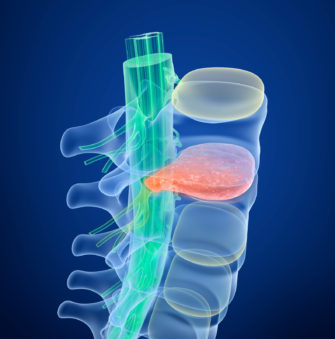Lumbar Disc Herniation Studies Show Safety of Chiropractic
 Chiropractic is widely known for providing safe, effective pain relief from many types of low back pain. But, what about when that pain is caused by a herniated disc? It’s good to know research shows that chiropractic remains a safe option for the vast majority of people suffering from this condition.
Chiropractic is widely known for providing safe, effective pain relief from many types of low back pain. But, what about when that pain is caused by a herniated disc? It’s good to know research shows that chiropractic remains a safe option for the vast majority of people suffering from this condition.
One such study, Safety of Spinal Manipulation in the Treatment of Lumbar Disk Herniations: A Systematic Review and Risk Assessment, was published in the 2004 Journal of Manipulative and Physiological Therapeutics. Researchers analyzed case reports, review articles, surveys and investigations related to spinal manipulation as a treatment for lumbar disc herniation. They also performed a search of published literature regarding adverse effects and associated risks.
Researchers calculated that among patients with lumbar disc herniation, the risk of spinal manipulation bringing about a clinically worsened herniation or cauda equina syndrome (CES) is less than 1 in 3.7 million!
How does this research compare to studies of the safety of nonsteroidal anti-inflammatory drugs (NSAIDs)? The odds are much higher for experiencing an adverse effect from over the counter medications according to a 2015 Scandanavian study. Researchers reviewed medical records of over 1.5 million patients and found that “one in 30 patients prescribed an NSAID by their general practitioner (GP) for a musculoskeletal complaint subsequently consult their GP with a likely or possible adverse drug reaction.”
NSAIDS are associated with stomach complications, however, in 2005 it was reported they may also be associated with heart attacks and strokes. Over the years, additional studies confirmed this risk.
In fact, so much evidence was compiled that in 2015 the FDA issued a Drug Safety Communication strengthening their warning for this family of medications. (For more information about this, see www.tnchiro.com/articles/fda-use-caution-nsaids-can-cause-heart-attacks-or-strokes/).
For those considering a surgical procedure to address a herniated disc, it is important to note that any surgery carries with it some degree of risk including: reaction to medications and anesthesia, pain, unexpected bleeding, blood clots, infection, swelling and scarring to name a few. Many of the risks associated with surgery are short-term and patients make a full recovery. However, some can be long-term or even fatal.
When comparing the data on adverse effects between these treatments, there is much evidence to support the use of chiropractic care prior to NSAIDS and surgery. In fact, the JMPT study concluded: “The apparent safety of spinal manipulation, especially when compared with other “medically accepted” treatments for lumbar disc herniation, should stimulate its use in the conservative treatment plan of lumbar disc herniation.”
Every patient is different and should be thoroughly evaluated before treatment of any type is rendered. If you have, or suspect you have, a herniated disc, it is important to be evaluated as soon as possible by a medical professional such as your doctor of chiropractic. If you are already receiving care from a medical doctor or considering surgery, talk to your providers about how chiropractic may be a beneficial for you.
In most cases, #chiropractic1st is a viable option that is both safe and effective. Some patients’ conditions will require surgical intervention and some may need medications. Some find relief from a combination of chiropractic and medications. And some find that conservative, chiropractic care is all that is needed. If you do not have a chiropractor, you can find a TCA member doctor near you at www.tnchiro.com/find-a-doctor.
REFERENCES:
Oliphant, Drew. Safety of Spinal Manipulation in the Treatment of Lumbar Disk Herniations: A Systematic Review and Risk Assessment. Journal of Manipulative & Physiological Therapeutics, Volume 27, Issue 3, 197 – 210
FDA: Use Caution – NSAIDS Can Cause Heart Attacks or Strokes – https://www.tnchiro.com/articles/fda-use-caution-nsaids-can-cause-heart-attacks-or-strokes/
Koffeman AR, Van Buul AR, Valkhoff VE, et al. Adverse drug reactions in a primary care population prescribed non-steroidal anti-inflammatory drugs. Scand J Prim Health Care. 2015;33(3):163–169. doi:10.3109/02813432.2015.1067513
___________________________________________________________________
This article was posted by the Tennessee Chiropractic Association (TCA) as a public service. The information and recommendations appearing on this page are appropriate in most instances, but they are not a substitute for a diagnosis by a specialist. For specific information concerning your health condition, consult your chiropractor. For more information, find articles and research summaries on tnchiro.com here.